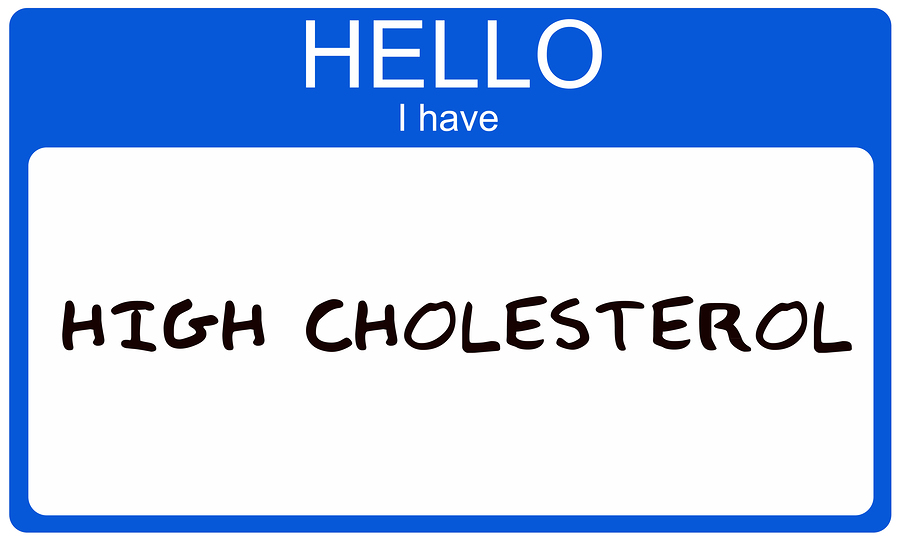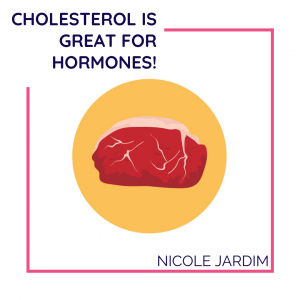This post was inspired by one of my private clients. She works in pharmaceutical sales and mentioned on our last call that the leading heart organizations in the US recently changed their guidelines on cholesterol-lowering drugs. I was unaware of this latest development in the “fight” against high cholesterol so I decided to do a little digging.
Here’s what most people know about cholesterol…it goes something like this: “My doctor said my cholesterol is too high and I may need to go on drugs to lower it.” If that hasn’t happened to you I’m sure you know someone who’s heard those words. Not surprising, as 36 million Americans are on cholesterol-lowering drugs (statins) and the new guidelines would double that figure to roughly 70 million people. I think there is something awfully wrong with that picture. How could such a large swath of the population be so broken?

Did you know that 25 years ago, the normal cholesterol range was 150-310 mg/dl. Today, if your total cholesterol (LDL and HDL) is over 200mg/dl, you’re in the danger zone and will be told to go on a cholesterol-lowering drug. It seems every year, the drug companies keep trying to lower the recommended total cholesterol and LDL cholesterol numbers so they can get more patients. At some point, everybody would be advised to be on a statin, which of course is ridiculous.
I’ve never really worried about my cholesterol because it was always super low – think 105mg/dl TOTAL. Keep reading before you start hating me ;-). My doctor once said to me with absolute certainty, “You will never have a heart attack Nicole.” Ha! If it was only that simple doc.
What does cholesterol do?
This is how I like to describe the role of cholesterol – think of your arteries and veins as a series of roads and highways. Over time potholes and other damage (inflammation) happens because of a crappy diet of mostly refined carbs, refined sugar, alcohol etc. Your body then releases cholesterol (the roadwork crew) to start patching the holes. The more damage you do, the more cholesterol you’ll produce to address said damage. Can you see why cholesterol isn’t inherently bad, and why cholesterol-lowering drugs aren’t the solution? They’re really just treating the symptoms of an underlying condition that’s causing the body to produce more cholesterol. Remove the causes of inflammation and oxidation and you lower cholesterol.
Here’s what you need to know:
1. Cholesterol is not bad for you. Eeeks, I said it!
FACT: Many alternative practitioners and followers of a more paleo-centered diet are well aware by now that dietary cholesterol does not significantly affect cholesterol levels in the blood or risk for heart disease, and that there is no longer any reason to avoid whole foods with naturally high levels of cholesterol.
Here’s an excerpt from an article written by Chris Kresser on why cholesterol levels are not affected by fat and cholesterol-rich foods:
“On any given day, we have between 1,100 and 1,700 milligrams of cholesterol in our body. 25% of that comes from our diet, and 75% is produced by the liver. Much of the cholesterol that’s found in food can’t be absorbed by our bodies, and most of the cholesterol in our gut was first synthesized in body cells and ended up in the gut via the liver and gall bladder. The body tightly regulates the amount of cholesterol in the blood by controlling internal production; when cholesterol intake in the diet goes down, the body makes more. When cholesterol intake in the diet goes up, the body makes less.”
“This explains why well-designed cholesterol feeding studies (where they feed volunteers 2-4 eggs a day and measure their cholesterol) show that dietary cholesterol has very little impact on blood cholesterol levels in about 75% of the population. The remaining 25% of the population are referred to as “hyper-responders”. In this group, dietary cholesterol does modestly increase both LDL (“bad cholesterol” and HDL (“good cholesterol”), but it does not affect the ratio of LDL to HDL or increase the risk of heart disease.
[1]
This basically means that cholesterol in food won’t give you a heart attack. So you can ditch the egg-white omelettes and start eating egg yolks again. This is especially important because all 13 essential nutrients found in eggs are in their yolks!
2. Cholesterol is crucial for hormone production & function:
Cholesterol is where MANY hormones come from – it is converted by the body into the “mother hormone” Pregnenolone, which then converts into numerous hormones including DHEA, progesterone, testosterone, the estrogens, and cortisol. Cholesterol is also a precursor to vitamin D. Kind of a big deal. If we don’t have enough cholesterol and pregnenolone, it is safe to say that the cascade of steroid hormone production in our bodies would be compromised.

My traditionally low levels of cholesterol might explain my tendency towards lower levels of estrogen, progesterone, testosterone and vitamin D. This is purely anecdotal, but increasing my fat and cholesterol intake over the last three years has significantly improved my hormone levels and my overall health. Has this been your experience too?
BTW, if you want to get your hormones tested, Lets Get Checked is my go-to provider for at-home hormone testing kits for myself and clients. You just order them online, have the kit shipped to you, then do the tests at home and send the kit back in the mail.
One and done.
And after processing, their team of physicians will review your results and a member of the nursing team will call you to deliver the results and discuss treatment options.
The most popular testing kits include the Female Hormone Test, the Thyroid Antibody Test, the Iron Check and the Vitamin D Test. Be sure to use discount code Hormones20 to get 20% off the price of all tests.
Ok, moving on…
3. Cholesterol-rich foods contain the B-vitamin choline.
Choline is essential for women during pregnancy, as low choline intake is significantly associated with a higher risk of neural tube defects in a newborn. Symptoms of choline deficiency include fatigue, insomnia, memory problems and even infertility [3]. The best dietary sources of choline are liver and egg yolks, which are often avoided by many Americans due to fear of dietary fat and cholesterol.
4. Cholesterol affects your brain health.
It plays an essential role in your brain, which contains about 25 percent of the cholesterol in your body. It is critical for the formation of synapses – the connections between your neurons, which allow you to think, learn new things, and create memories. In fact, there’s reason to believe that low-fat diets and/or cholesterol-lowering drugs may cause or contribute to Alzheimer’s disease. Low cholesterol levels have also been linked to violent behavior [4], due to adverse changes in brain chemistry, particularly a reduction in serotonin activity.
Fascinating facts:
Your cholesterol level is influenced by the different phases of your menstrual cycle [5]. Yes ma’am, your cholesterol levels correspond to your estrogen levels and can change by as much as 19% depending on where you’re at in your cycle.
There is a syndrome called Smith-Lemli-Opitz syndrome or SLOS. This causes a person to not make enough cholesterol on their own. If a fetus has the genes responsible for this syndrome, it almost always results in spontaneous abortion – meaning that cholesterol is needed to maintain life itself.
The idea is to use your intuition when it comes to your own cholesterol levels. My levels have gone up 35 points in the last three years and I feel MUCH better now than I did then. I eat more butter, coconut oil/butter, grass-fed beef and avocados than ever! Although my doctor told me I’d never die of a heart attack with cholesterol levels at 110, I’m willing to take my chances 🙂




6 thoughts on “Cholesterol is great for hormones!”
I’m 40 years old and have been told my cholesterol was too high since I was 19 and first had it checked. So I’ve been on statins for awhile, Also I just recently was told I have no pregnenolone and all my hormones are low, vitamin D was in single digits as well….so I’m taking supplements. I’ve never heard of this until now. I had no clue hormones had anything to do with cholesterol. I had also never heard of Pregnenolone before either. I’m finding this very interesting.
Has anyone else had problems with not producing Pregnenolone? I’m finding it hard to get information on this problem.
Hi Nicole! So glad about this article. Thank you. I just recently had my annual physical exam with full blood work and noticed my cholesterol level was a tad bit close to “high” mark. My primary care physician sent me an email warning about it too. But since I don’t trust the doctors I syaryed doing my own digging. Now knowing what you have written in your article, I am definitely not going to pass on my ghee, coconut oil nor eggs. I wasn’t anyway but your research definitely helps. Thank you again for your wonderful work!
Hi Leah! Thank you soooo much, you’re such a gem! I really appreciate your kind words and your referral. I haven’t heard from Andrew yet so if you want to do an intro just email us both. You can email me at support@nicolejardim.com. Thanks! xoxo
Hi Nicole,
Great informative post as usual! You really know your stuff! So many people -even medical practitioners are so stuck in the 1980’s way of thinking when it comes to diet and lifestyle…I experience this regularly. I recently recommended you to an acquaintance of mine, I hope you don’t mind but he is a Natural fertility expert here in the UK whom has a fantastic team working with him whom are all committed and passionate about the work they do and he orchestrates a free monthly online fertility event and was looking for suggestions for guest speakers, you were the first expert that came to mind that I would love to hear speak at one of his online events. His name is Andrew Loosely.
Kind regards
Leah
Hi Stasia! Definitely don’t feel bad about craving anything! But if you have butter be careful with the bread, especially if it contains gluten, as gluten can be a trigger for many many people, even if we aren’t experiencing obvious symptoms. Evidence shows that it’s the carbohydrates that cause this inflammatory response in the body that we’re trying to avoid. xoxo
Great post! I also have traditionally low cholesterol, and am taking Vitamin D daily. But I’ve never really avoided foods with high cholesterol, so I won’t change my diet too much (and won’t feel bad about craving bread and butter either!)